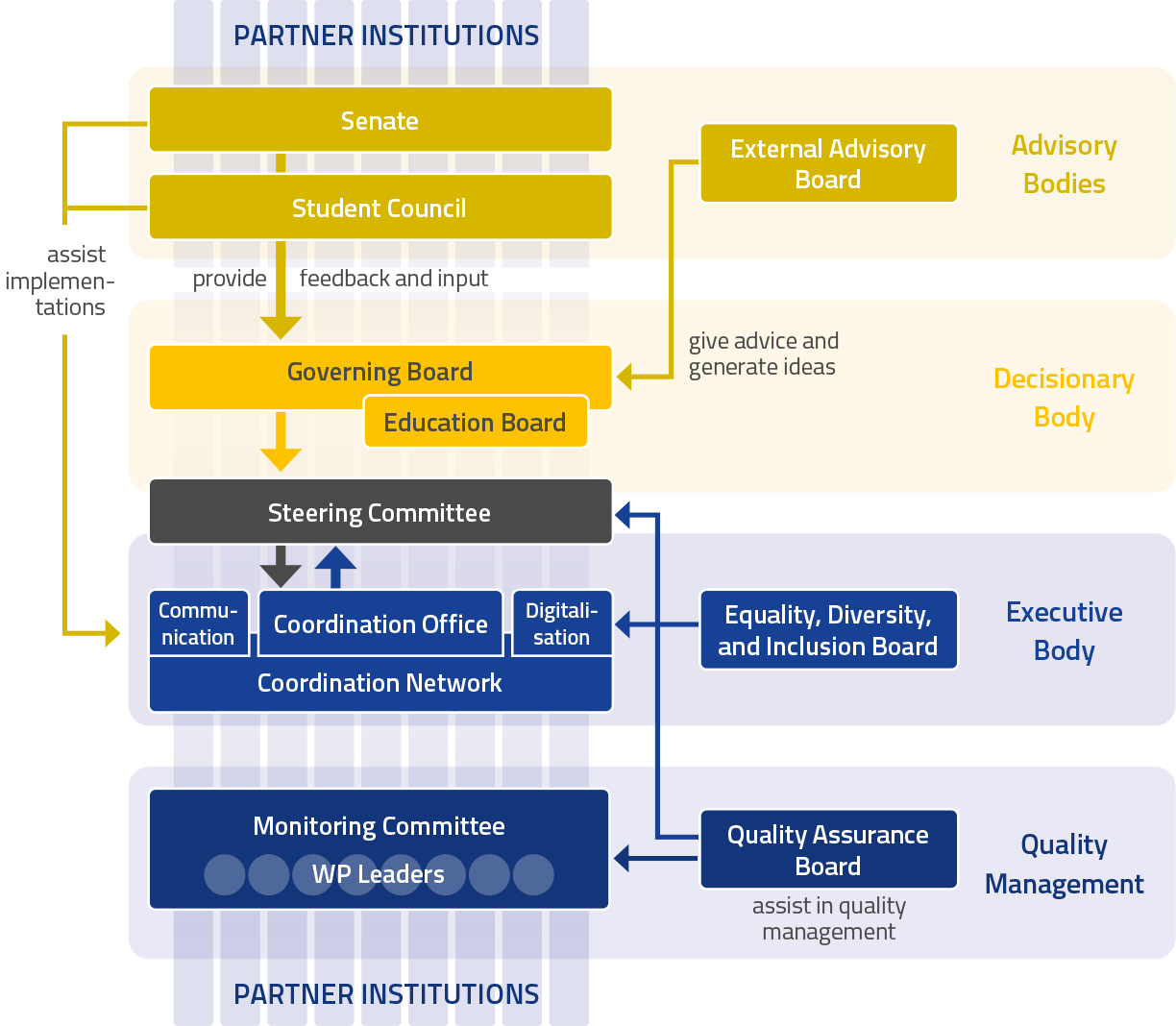
Governing Board
The Governing Board (GB) is the main decision-making body in charge of steering the strategic guidelines of the Alliance, and provides political support, orientation and validation for the necessary aspects of project-based activities and the development of EUPeace in general. It comprises the Rectors and Presidents of the member institutions or their direct representatives.
Steering Committee
The Steering Committee (SC) has a guiding function to the EUPeace governing bodies and is a link to the coordinating bodies. It consists of two persons per alliance member, one representing the upper administrative level and one at the academic level with direct responsibility for implementation of alliance activities at their institution.
Coordination Office
The Coordination Office (CO) is the overarching entity organising the everyday management of EUPeace and the first administrative unit to deal with matters pertaining to the execution of EUPeace activities. It is the leading entity in the coordination between different groups of stakeholders and all member sites, and oversees general implementation and progress. It is headed by the Secretary General with support of the full team.
Education Board
The Education Board (EB) oversees in particular the process of joint curriculum development and related initiatives, and enables all universities to actively participate and contribute their particular perspectives, competencies and working input. Its members are the institutions’ Vice-Rectors and Vice-Presidents for Education, Study, and Teaching.
Research Council
The Research Council (RC) unities the Vice-Rectors/Vice-Presidents in charge of research as well as the heads of units accompanying researchers and research projects at the different univerisities. The Council advises and accompanies alliance-wide research initiatives and supports the emphasising of alliane-specific research foci, shared with and embedded in the universities.
Coordination Network
The Coordination Network (CN) carries project management, coordination of activities, monitoring of progress etc. into each institution. The Coordination Network represents EUPeace administration at local level and ensures that information of the Coordination Office is transferred into the member institutions via dedicated local coordinators. The Coordination Network is composed of correspondents at each institution together with representatives of the Coordination Office.
Communications Office
The Communications Office is an integral part of the Coordination Network/Coordination Office, as such it is guided by the Secretary General and is coordinated by the EUPeace Communications Officer. Its main tasks are internal communication and the promotion of identity and belonging among Alliance members and all participants. It also supports the external communication activites of the Alliance.
Digitisation Office
The Digitisation Office is an integral part of the Coordination Network/Coordination Office, as such it is guided by the Secretary General and is coordinated by the EUPeace Digitisation Officer. It supports the different teams working on digitisation issues, especially the work carried out for the Online Campus, and assures state-of-the-art work on data security standards, network wide EDI standards etc.
Student Council
The Student Council (STC) consists of two elected representatives per member and works closely with all other bodies, ensuring the representation of students in the Alliance and providing input and a relay for implementation.
Equality, Diversity and Inclusion Board
The Equality, Diversity and Inclusion Board (EDIB) analyses everyday exclusions and enforces the re-creation of all EUPeace campuses as safe spaces for diversity. It provides among others advice, together with the Student Council, to the teams working on the development of a joint EUPeace Code of Conduct for the promotion of diversity and to foster inclusiveness.
Quality Assurance Board
The EUPeace Quality Assurance Board (QAB) is an advisory body to the EUPeace Alliance, primarily concerned with matters of quality assurance of joint educational offers of the Alliance. The QAB works closely with the Education Board, both bodies consult each other regularly and as appropriate.
Monitoring Committee
The Monitoring Committee (MC) is in charge of all monitoring and evaluation activities related to project-based-activities of EUPeace. It is the body responsible for the quality assurance of project activities within the Alliance.
Senate
The Senate consists of one representative for each status group (students, doctoral candidates, early career researchers, faculty, administration) for each alliance member. It represents the different EUPeace communities at the level of the Alliance. It provides input and feedback on the implementation of the activities and their effect on the individual groups within EUPeace.
External Advisory Board
The External Advisory Board (EAB) is an independent advising entity that can be called upon for general strategic advice as well as for an outside view on specific items of concern or dispute. It provides strategic advice on past achievements, on current performances and on future goals. The External Advisory Board prepares an annual report with recommendations to the Governing Board. It is composed of recognised experts from different sectors supporting the overall goals of the Alliance.
